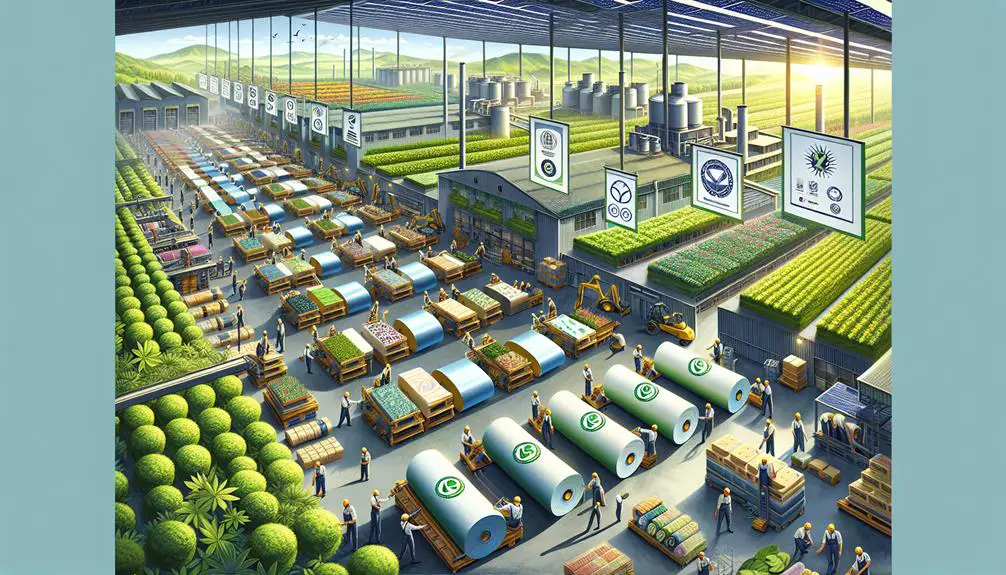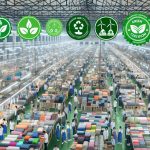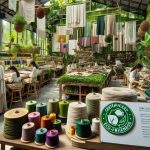When you think about sustainable textiles, certifications like GOTS, Fair Trade, and OEKO-TEX might come to mind. These certifications do more than just reassure you about product quality; they also guide you towards making environmentally and socially responsible choices. By understanding these certifications, you can actively support ethical labor practices and help reduce environmental impact. But how exactly do these certifications influence consumer behavior and brand practices? And what future trends might shape this evolving landscape?
Table of Contents
Key Takeaways
- Certifications ensure textiles meet strict environmental and ethical standards.
- Certified textiles reduce water pollution and energy consumption during production.
- Certifications provide transparency, building consumer trust in eco-friendly products.
- Brands use certifications to differentiate and attract eco-conscious customers.
- Evolving certifications include social responsibility and foster global collaboration.
Importance of Sustainable Certifications
Understanding the significance of sustainable certifications helps you make informed choices about the textiles you purchase. When you know what these certifications represent, you verify that the products you buy align with industry standards and ethical sourcing practices. By prioritizing certified textiles, you support manufacturers committed to reducing their environmental impact and fostering fair labor conditions.
Industry standards are essential because they establish a baseline for what constitutes sustainability in the textile sector. They help you differentiate between genuinely eco-friendly products and those that merely claim to be. Certifications act as a guarantee that a product meets these rigorous criteria, giving you confidence in your choices.
Ethical sourcing ensures that the raw materials and labor used in textile production are responsibly managed. It means workers are treated fairly, receive fair wages, and work in safe conditions. When you choose textiles with sustainable certifications, you're not just buying a product; you're endorsing a system that values human dignity and environmental stewardship.
Types of Textile Certifications
You'll often encounter various types of textile certifications that signal a dedication to sustainability and ethical practices. One prominent certification is the Global Organic Textile Standard (GOTS), which guarantees that the textiles are made from organic cotton. GOTS certification covers the entire supply chain, from harvesting the raw materials to manufacturing and labeling, guaranteeing that the final product meets strict environmental and social criteria.
Another key certification is the Fair Trade Certified label. This certification focuses on fair trade practices, aiming to provide better prices, decent working conditions, and fair terms of trade for farmers and workers. By choosing products with this label, you support communities and help promote sustainable development.
The OEKO-TEX Standard 100 is another essential certification. It tests textiles for harmful substances, ensuring that the products are safe for human use. This certification is particularly significant for consumers concerned about chemical exposure.
Lastly, the Bluesign certification addresses sustainability and safety in the textile industry. It covers the entire production process, guaranteeing that products are made with minimal environmental impact and safe chemicals.
Understanding these certifications empowers you to make informed choices, contributing to a more sustainable and ethical textile industry.
Impact on Environmental Practices
Choosing textiles with certified sustainability practices significantly reduces your environmental footprint. By opting for products that meet strict environmental regulations, you actively contribute to a greener planet. The textile industry is well-known for its environmental impact, from water pollution to excessive energy consumption. Certifications guarantee that the entire supply chain adheres to sustainability practices, minimizing these adverse effects.
When you choose certified textiles, you're supporting companies that commit to sustainable sourcing, ethical labor practices, and reduced chemical usage. These certifications don't just apply to the final product but cover every stage of production. This means that the raw materials, manufacturing processes, and even packaging are scrutinized for their environmental impact. By doing so, you're holding the textile industry accountable and fostering a culture of responsibility and transparency.
Environmental regulations play an important role here. Certifications often align with or exceed governmental standards, ensuring that your choices are supported by rigorous, science-based criteria. This alignment not only safeguards our ecosystems but also encourages continuous improvement within the industry. So, every certified textile you purchase is a step towards a more sustainable future, reinforcing effective supply chain sustainability practices.
Benefits for Consumers and Brands
By embracing certified sustainable textiles, both consumers and brands reap significant benefits that extend beyond environmental impact. As a consumer, you gain peace of mind knowing that your purchases align with ethical and eco-friendly practices. Certifications provide a reliable measure, ensuring that the textiles meet stringent sustainability criteria. This transparency fosters consumer trust, making you more confident in your buying decisions.
For brands, the advantages are equally compelling. By committing to certified sustainable textiles, you differentiate your brand in a crowded market. This distinction not only appeals to eco-conscious consumers but also sets a higher standard within the industry. You can position your brand as a leader in sustainability, bolstering your reputation and attracting a loyal customer base.
Moreover, certifications can streamline your supply chain by guaranteeing that your materials comply with specific environmental and social criteria. This assurance reduces the risk of negative publicity and enhances your brand's credibility.
Essentially, certified sustainable textiles serve as a strategic asset, fostering consumer trust and elevating brand differentiation. By integrating these certifications, you're not just promoting sustainability; you're building a stronger, more trusted, and distinguished brand.
Future Trends in Certification
Looking ahead, several emerging trends in textile certification are poised to reshape the industry.
You'll find that industry innovation is driving the need for more extensive and stringent global standards. Certifications are no longer just about meeting basic environmental criteria; they're evolving to encompass social responsibility, transparency, and circular economy principles.
As a stakeholder, staying updated on these developments will be vital for maintaining a competitive edge.
Consumer education is another crucial factor.
Today's consumers are more informed and discerning, demanding greater transparency in the products they purchase. You'll need to invest in educating your audience about the meaning and importance of various certifications.
This not only builds trust but also aligns with growing market demand for verified sustainable practices.
Moreover, the push for harmonized global standards can't be ignored.
As the textile industry becomes more interconnected, having universally recognized certifications will simplify compliance and foster international collaboration.
This shift will also help you streamline supply chains and reduce costs.
Frequently Asked Questions
How Can Small Businesses Afford Certification Costs?
To manage certification costs, you should explore cost considerations carefully and investigate funding options like grants, partnerships, and government programs. Prioritizing these strategies can make certification more accessible for your small business.
Are There Certifications Specific to Particular Regions or Countries?
Yes, there are certifications specific to regions or countries. Understanding global vs. local certification criteria is important. Local certifications often address unique environmental or cultural needs, while global ones guarantee broader compliance with international standards.
What Are the Steps to Apply for a Textile Certification?
Ever dream of obtaining Excalibur? First, research the application process for your chosen certification. Gather required documents, submit your application, and prepare for an audit. Certification benefits include market trust and environmental impact credibility.
Can Certifications Be Revoked, and Under What Circumstances?
Yes, certifications can be revoked if standards aren't maintained, impacting certification credibility. The revocation process typically involves audits and reviews to guarantee compliance. If non-compliance is found, the certification is revoked to safeguard integrity.
How Do Certifications Affect the Supply Chain of Textile Companies?
You'll see certifications greatly impact your supply chain by ensuring ethical sourcing and reducing environmental impact. They boost consumer awareness and market demand, ultimately driving your business towards more sustainable and responsible practices.







